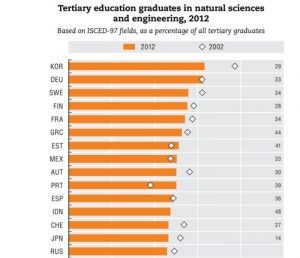According to the latest available data, published annually by the Organization for Economic Co-operation and Development (OECD), Greece has the sixth-highest number of “STEM” graduates in the world. The latest findings were gleaned from information gathered from the OECD during the year 2012.
STEM is a term used to signify science, technology, engineering and math degrees. The OECD counts the number of such degrees awarded per capita of each country, so that there is a clearer comparison, regardless of the population of each country.

(Greece stands sixth in the world, with 26% of its degrees being awarded in the fields of STEM)
Twenty-six percent of the total degrees awarded in Greece are in science, which includes the fields of technology, engineering or math, which is two percentage points lower than 2002’s 28 percent.
The fact that the country spends only 0.08 percent of its GDP on research doesn’t seem to discourage Greek students, who continue to choose STEM-related majors in large numbers.
Since the time of the last survey, Greece has significantly increased the amount of money it spends on research. In 2016, Research & Development constituted 0.99 percent of the country’s GDP, according to the official provisional data of the National Documentation Centerof Greece.
Even more impressive is the fact that Greece ranked second in the world, behind only Italy, regarding the number of women who chose natural sciences and engineering for their post-secondary education. Forty-four percent of individuals studying in these fields were women, compared to an average of 34 percent overall throughout the areas of the OECD.
South Korea tops the list for STEM graduates, as the country has a long tradition of natural sciences and engineering education. However, the country recorded a significant drop from the number of STEM graduates in 2002.
Other countries having higher higher percentages of STEM graduates than Greece were the nations of Germany, France, Finland and Sweden.
Source: Nick Kampouris/greekreporter
Ask me anything
Explore related questions





